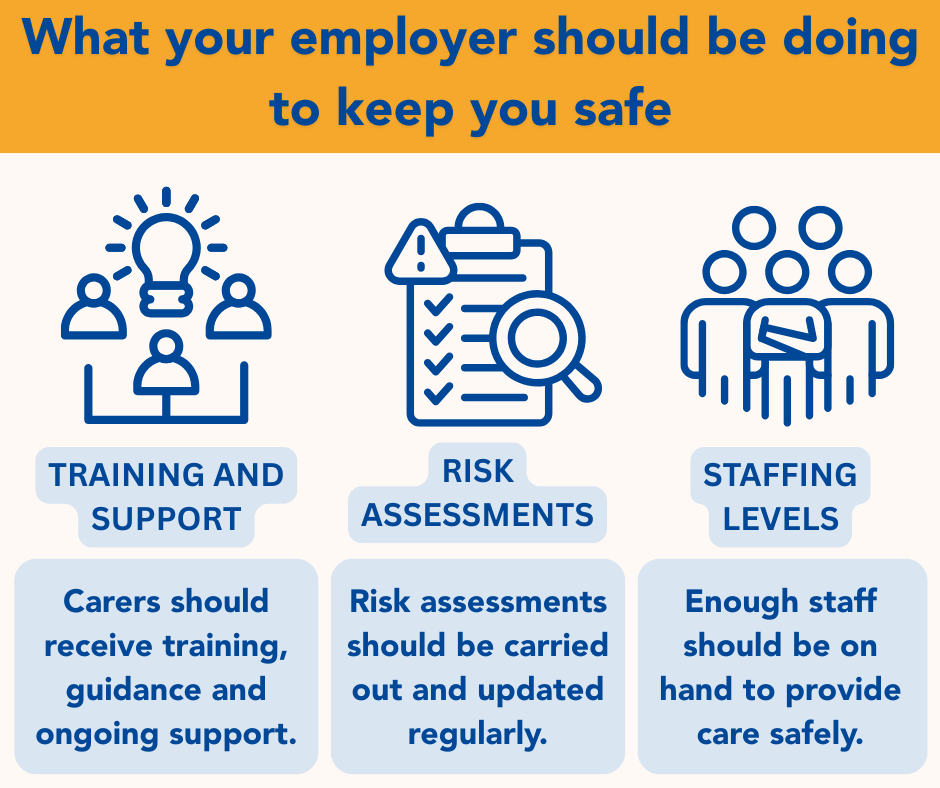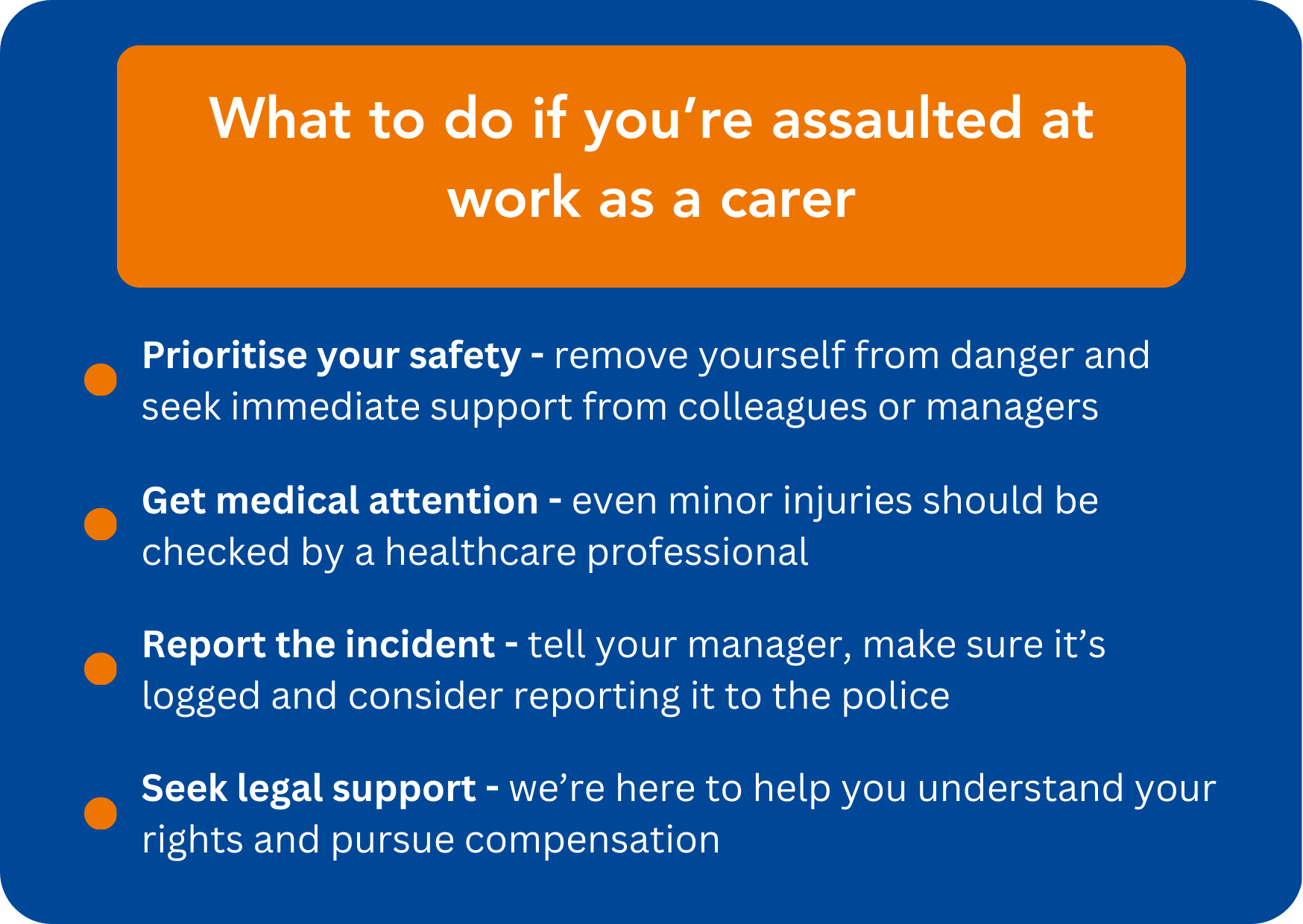Assaulted at Work as a Carer: Who is Responsible?

Who is responsible if a service user assaults a carer?
Residents of care homes and other social care service users are typically vulnerable. This can mean some residents may be more likely to react unpredictably to certain situations and events.
Although it would be easy to only blame the resident or service user who assaulted you at work, there may be others who could be held responsible. After all, a resident may be confused or trying to defend themselves by acting violently.
Ultimately, your employer must take all reasonable steps to keep staff members safe. They should:
- Have clear reporting processes for any cases of abuse or violence
- Take staff concerns seriously when raised and respond promptly
- Provide training and support to help you handle challenging situations
- Regularly carry out risk assessments
Where service users are known to be violent, your employer should make sure appropriate safety measures are in place when providing care for these individuals.
If your employer has failed in these responsibilities, they could be held responsible if you suffer an assault at work. And you could be able to make an accident at work claim for compensation.
What to do if you’ve been assaulted at work
If you’ve been assaulted at work as a carer, you should take steps to protect yourself, record what happened and ensure you receive the right support.
Here are the important actions to take:
- Ensure your immediate safety
Remove yourself from the situation if possible and seek help from colleagues or managers. - Get medical attention
Arrange a medical check-up even if your injuries seem minor, as some may worsen later. - Report the incident
Inform your line manager of what happened as soon as it’s safe to do so. You may also wish to report the assault to the police. - Record everything in writing
Make sure the incident is recorded in your company’s accident book and keep records of medical treatment you’ve received. - Seek legal support
We’ll help you find the right solicitor to guide you through the process of making a claim.
How much compensation you could be entitled to
The amount of compensation you could receive depends on how serious your injuries are and the wider impact on your life.
If your claim is successful, your final settlement will be based on factors such as:
- Your pain and suffering – both now and in the future
- Loss of earnings – if you’ve had to take time off work to recover
- Medical and care costs – including treatment, counselling or rehabilitation
- Travel costs – to and from medical appointments
Every case is different, so there is no set compensation amount for these types of claims. The best way to find out what your claim could be worth is to speak with a specialist solicitor.
The risks to carers at work
As a carer, you should be able to do your job without being afraid.
Employers should make sure staff aren’t left alone to cope with violence – whoever this comes from.
But sadly, assaults still happen. In 2025, nearly a quarter of carers (24.6%) reported that they had experienced or witnessed physical violence between 1-10 times. This is according to the Care Workers’ Charity Wellbeing Report.
Violent and aggressive incidents are also the third biggest cause of injuries reported to the Health and Safety Executive (HSE) from the health and social care sector.
Although protections for carers exist on paper, the risks remain real. That’s why it’s so important that employers not only have safety policies, but put them into practice every day.

How important are risk assessments in care settings?
Risk assessments are an important way to keep both carers and service users safe. They highlight possible dangers and help to reduce the risk of harm.
They are especially vital in care settings where staff support people with complex needs or challenging behaviours.
A good risk assessment should:
- Spot potential risks – such as aggression or manual handling issues
- Set out clear steps for dealing with incidents
- Be kept up-to-date as risks change over time
- Protect carers as well as service users
When done well, risk assessments make difficult situations easier to manage and help carers feel safer at work.
Support for carers after workplace assault
We know that an assault can result in more than just physical injuries. You may be struggling with the emotional and financial implications of the incident, too. But there is support available.
Emotional support:
- Many carers experience shock, stress or anxiety after an assault. Accessing counselling or occupational health services can make a big difference.
- Talking to your GP may also help you access mental health support.
Financial support:
- If you need to take time off work to recover, you may be entitled to sick pay or benefits.
- You could also claim compensation for lost earnings and other financial losses linked to the assault.
- The Care Workers’ Charity and similar organisations may also be able to help you with a grant if you’re struggling financially.
Legal support:
- If your employer failed in their duty to protect you, you could pursue a care worker accident claim.
- If your employer sacks you or treats you poorly for making a claim, you could take further legal action.
Meet Jacqueline
Head of Legal Services
Jacqueline Busby has has worked in the legal sector since 2009 and has handled complex injury cases.
She says: "An injury can cause both physical and financial distress. If you've had to take time off work to recover, you may be concerned about how to pay your bills. But you're entitled to compensation after an accident that wasn't your fault."

How First4Lawyers can help
At First4Lawyers, we stand up for carers who have been assaulted at work. Our specialist solicitors will explain your rights, guide you through your legal options and help you pursue the compensation you deserve on a No Win No Fee basis.
Having worked in the personal injury industry for many years, our Head of Legal Services and qualified solicitor Jacqueline Busby has seen first-hand how damaging these incidents can be:
“Everyone has the right to feel safe at work, and it can be devastating when accidents or assaults take place. You may no longer feel like you’re protected in the job you love, and many people decide to change roles completely.
“But it’s important to understand that there is support available after suffering a workplace assault.
“Making a claim isn’t just about the compensation. It could also open the door to specialist medical treatment, counselling or physiotherapy. So you can focus on getting as close to your old self as possible.”
To speak to one of our expert team with no obligation to go ahead, arrange your free consultation here.
Only pay a fee if you receive compensation
Where we offer No Win No Fee services typically customers pay 25% of the amount recovered to our solicitors, although this may be higher or lower subject to your individual circumstances. Please note this excludes claims for Road Traffic Accidents where customers typically pay 35% + VAT due to changes introduced through the Civil Liability Act 2018.
First4Lawyers are an award-winning claims management company with a track record of delivering service that our clients love.
Frequently asked questions
Can I sue my employer for negligence after a workplace assault?
Yes, in some cases you may be able to take legal action against your employer.
Employers have a duty of care to protect staff from foreseeable harm, including violence in the workplace.
If your employer failed to take reasonable steps to keep you safe, you could have grounds to claim for negligence. This could include not providing proper training, not offering safety measures after previous incidents or not ensuring safe staffing levels.
What are my rights after being assaulted as a carer?
After an assault, you have the right to:
- Report the incident without fear of punishment – your employer must take what happened seriously and investigate
- Medical attention and support – including time off to recover if needed
- A reasonably safe working environment – your employer should review care plans, staffing levels and procedures to prevent future incidents
- Access to a complaints process – including the right to raise a formal grievance if you feel unsafe or unsupported
- Legal support – you have the right to pursue compensation if you feel your employer failed in their duty of care towards you
Knowing your rights means you don’t have to face the impact of a workplace assault alone.
Can I refuse to work with a service user?
You have the right to work in a safe environment. If a service user has assaulted you or you believe there is a serious risk to your safety, you should raise this with your manager straight away.
While you cannot usually refuse to work with a service user without a valid reason, your employer must take your concerns seriously and take steps to protect you.
This could mean reviewing the care plan, increasing staffing levels or assigning a different carer. If your employer ignores your concerns and you feel unsafe, you may have grounds to escalate the issue.
Who should I report assaults at work to?
If you’re assaulted at work, you should report the incident to your line manager or supervisor as soon as it’s safe to do so.
Under the Reporting of Injuries, Diseases and Dangerous Occurrences Regulations 2013 (RIDDOR), your employer is responsible for logging the details of your accident. In some cases, they may also have to report the accident to the Health and Safety Executive (HSE).
You may also choose to report the assault to the police. They’ll decide whether an investigation or prosecution is appropriate. Even if charges aren’t pursued, reporting it will create an official record of what happened. This could be helpful if you make a claim.
We know the thought of taking legal action can feel overwhelming, especially at such a difficult time. But we’re here to support you through the process.
If you’ve been assaulted at work as a carer, our team is here to listen and support you.
Get in touch with us for a free initial chat. We’ll ask a few simple questions and discuss your next steps with you – all at your own pace.
To reach us, you can give us a call on the number at the top of the screen or fill in our quick and easy online form.


